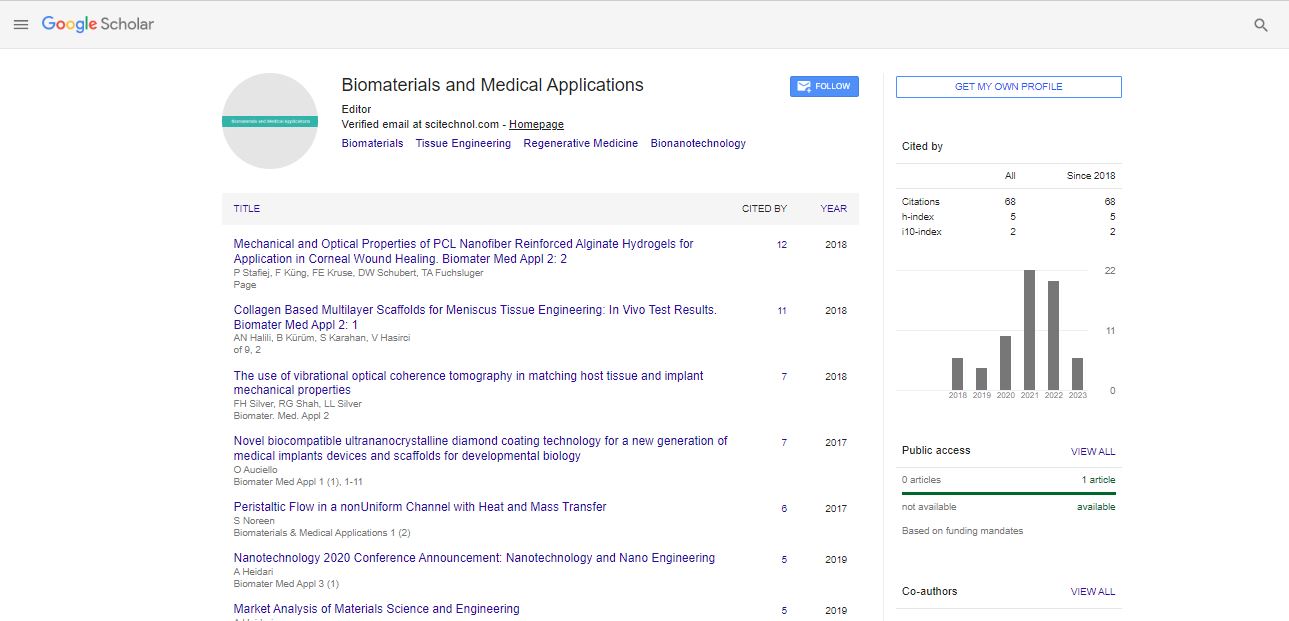Commentary, Biomater Med Appl Vol: 7 Issue: 3
Genetic Engineering of Microbes for Enhanced Biofuel Production
Ahkam Ahmad*
Department of Biotechnology and Biomolecular Sciences, University of Putra, Selangor, Malaysia
*Corresponding Author: Ahkam Ahmad
Department of Biotechnology and Biomolecular Sciences, University of Putra, Selangor, Malaysia
E-mail: ahmadahkam@hotmail.com
Received date: 14 April, 2023, Manuscript No. BMA-23-95948;
Editor assigned date: 17 April, 2023, PreQC No. BMA-23-95948 (PQ);
Reviewed date: 02 May, 2023, QC No. BMA-23-95948;
Revised date: 14 June, 2023, Manuscript No. BMA-23-95948 (R);
Published date: 21 June, 2023, DOI: 10.36648/2577-0268.100526
Citation: Ahmad A (2023) Genetic Engineering of Microbes for Enhanced Biofuel Production. Biomater Med Appl 7:3.
Description
Genetic engineering has been a game-changer in the field of biotechnology, enabling scientists to modify organisms at the genetic level for specific purposes. In recent years, genetic engineering has also been used to enhance biofuel production by modifying the genes of microbes, such as bacteria and yeast that are used in the process. This has opened up new possibilities for creating sustainable and efficient sources of bioenergy.
One of the key ways in which genetic engineering has been used to enhance biofuel production is by improving the efficiency of the metabolic pathways that are involved in the process. Microbes used for biofuel production, such as bacteria and yeast, have specific metabolic pathways that allow them to convert sugars and other organic compounds into biofuels. These pathways, however, are not always efficient, and may require optimization to maximize the yield of biofuels produced.
Genetic engineering allows scientists to modify the genes involved in these metabolic pathways to improve their efficiency. For example, researchers have successfully modified the genes of yeast to increase the production of ethanol, a biofuel that is commonly used as a gasoline substitute. By introducing specific genes into the yeast, they were able to enhance the activity of the metabolic pathway that converts sugars into ethanol, resulting in a significant increase in ethanol production.
Another way in which genetic engineering has been used to enhance biofuel production is by introducing new metabolic pathways into microbes. Microbes naturally have a limited set of metabolic pathways that they can use to convert organic compounds into biofuels. By introducing new pathways into these microbes, scientists can expand their metabolic capabilities and enable them to produce new types of biofuels.
For example, researchers have successfully introduced a new metabolic pathway into E. coli bacteria that allows them to convert carbon dioxide into biofuels such as isobutanol. This pathway was originally found in photosynthetic organisms such as cyanobacteria, and was introduced into E. coli using genetic engineering techniques. The resulting E. coli strain was able to produce isobutanol from carbon dioxide, demonstrating the potential of genetic engineering for creating new, sustainable sources of bioenergy.
Genetic engineering has also been used to improve the tolerance of microbes to environmental stresses, such as high temperatures or the presence of toxic compounds. These stresses can be a major challenge for biofuel production, as they can inhibit the growth and activity of the microbes used in the process. By modifying the genes of these microbes, scientists can enhance their ability to tolerate these stresses, making them more robust and resilient.
For example, researchers have successfully modified the genes of yeast to improve their tolerance to high temperatures, which can be a major challenge in biofuel production. By introducing specific genes into the yeast, they were able to improve their ability to withstand high temperatures, resulting in higher yields of biofuels produced under these conditions.
Overall, genetic engineering has enormous potential for enhancing biofuel production by modifying the genes of microbes used in the process. By improving the efficiency of metabolic pathways, introducing new pathways, and enhancing the tolerance of microbes to environmental stresses, genetic engineering can enable the creation of new, sustainable sources of bioenergy.
However, it is important to note that genetic engineering also raises ethical and safety concerns, particularly when it comes to the release of Genetically Modified Organisms (GMOs) into the environment. There is a need for careful regulation and oversight of genetic engineering research to ensure that it is conducted safely and responsibly.
Conclusion
In conclusion, genetic engineering is a powerful tool for enhancing biofuel production by modifying the genes of microbes used in the process. It has already enabled significant advances in the field, and holds enormous potential for creating new, sustainable sources of bioenergy. However, it is important to approach genetic engineering research with caution and to ensure that it is conducted in a safe and responsible manner. By doing so, we can unlock.
 Spanish
Spanish  Chinese
Chinese  Russian
Russian  German
German  French
French  Japanese
Japanese  Portuguese
Portuguese  Hindi
Hindi 